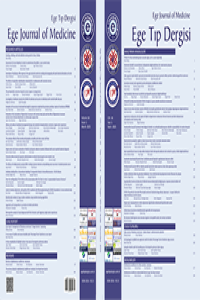Abstract
Nörojenik pulmoner ödem, santral sinir sistemi hasarına sekonder olarak gelişen artmış adrenerjik cevap, katekolamin seviyesinde artış, pulmoner hidrostatik basınç artışı sonucu meydana gelen alveolar ödemdir. Nörojenik pulmoner ödem nedenleri arasında, travmatik beyin hasarı, felç, intrakranial kanama, akut hidrosefali, menenjit, aşırı doz ilaç alımı ve epilepsi yer alır. Pulmoner ödeme bağlı nefes darlığı, öksürük, pembe köpüklü balgam gibi nonspesifik semptomlar izlenebilir. Biz 43 ve 32 yaşlarında, epilepsi tanılı iki hastanın epileptik nöbet sonrası gelişen solunumsal yakınmalar ile acil servise başvurup yapılan tetkikler sonucu nörojenik pulmoner ödem tanısı alan ve sonrasında semptomatik tedaviyle klinik düzelme görülen iki vakayı sunuyoruz.
References
- Davison DL, Terek M, Chawla LS. Neurogenic pulmonary edema. Crit Care. 2012;16(2):212. doi:10.1186/cc11226.
- Milanlıoğlu A, Çilingir V, Gökgül A, et al. Recurrent Neurogenic Pulmonary Edema. Ortadogu Tıp Derg 2015;7(1):53-5.
- Sedy J, Zicha J, Kunes J, et al. Mechanisms of neurogenic pulmonary edema development. Physiol Res 2008;57:499-06. doi:10.33549/physiolres.931432.
- Sova M, Franc D, Ctvrtlik F, et al. Neurogenic Pulmonary Oedema as a Rare Complication of Epileptic Seizures. Advances in Respiratory Medicine. 2019; 87(5):298-00. doi.org/10.5603/ARM.2019.0052.
- Demling R., Riessen R. Pulmonary dysfunction after cerebral injury. Critical Care Medicine. 1990;18(7):768–74. doi:10.1097/00003246-199007000-00019.
- Zhao H., Lin G., Shi M., et al. The mechanism of neurogenic pulmonary edema in epilepsy. The Journal of Physiological Sciences. 2014;64(1):65–2. doi:10.1007/s12576-013-0291-6.
- Pender ES, Pollack CV Jr. Neurogenic pulmonary edema: case reports and review. J Emerg Med 1992;10:45–1. doi:10.1016/0736-4679(92)90010-q.
- Baumann A, Audibert G, McDonnell J, et al. Neurogenic pulmonary edema. Acta Anaesthesiol Scand 2007;51:447–55. doi:10.1111/j.1399-6576.2007.01276.x.
Abstract
Neurogenic pulmonary edema is a form of alveolar edema that results from an increased adrenergic response secondary to central nervous system injury. It is characterized by elevated catecholamine levels and increased pulmonary hydrostatic pressure. The causes of neurogenic pulmonary edema include traumatic brain injury, stroke, intracranial hemorrhage, acute hydrocephalus, meningitis, drug overdose, and epilepsy. Non-specific symptoms such as shortness of breath, cough, and pink frothy sputum may occur due to pulmonary edema. We present two cases of patients, aged 43 and 32, both diagnosed with epilepsy, who presented to the emergency department with respiratory complaints following epileptic seizures. Diagnostic evaluations confirmed neurogenic pulmonary edema, and clinical improvement was observed following symptomatic treatment.
References
- Davison DL, Terek M, Chawla LS. Neurogenic pulmonary edema. Crit Care. 2012;16(2):212. doi:10.1186/cc11226.
- Milanlıoğlu A, Çilingir V, Gökgül A, et al. Recurrent Neurogenic Pulmonary Edema. Ortadogu Tıp Derg 2015;7(1):53-5.
- Sedy J, Zicha J, Kunes J, et al. Mechanisms of neurogenic pulmonary edema development. Physiol Res 2008;57:499-06. doi:10.33549/physiolres.931432.
- Sova M, Franc D, Ctvrtlik F, et al. Neurogenic Pulmonary Oedema as a Rare Complication of Epileptic Seizures. Advances in Respiratory Medicine. 2019; 87(5):298-00. doi.org/10.5603/ARM.2019.0052.
- Demling R., Riessen R. Pulmonary dysfunction after cerebral injury. Critical Care Medicine. 1990;18(7):768–74. doi:10.1097/00003246-199007000-00019.
- Zhao H., Lin G., Shi M., et al. The mechanism of neurogenic pulmonary edema in epilepsy. The Journal of Physiological Sciences. 2014;64(1):65–2. doi:10.1007/s12576-013-0291-6.
- Pender ES, Pollack CV Jr. Neurogenic pulmonary edema: case reports and review. J Emerg Med 1992;10:45–1. doi:10.1016/0736-4679(92)90010-q.
- Baumann A, Audibert G, McDonnell J, et al. Neurogenic pulmonary edema. Acta Anaesthesiol Scand 2007;51:447–55. doi:10.1111/j.1399-6576.2007.01276.x.
Details
| Primary Language | English |
|---|---|
| Subjects | Chest Diseases |
| Journal Section | Case Report |
| Authors | |
| Publication Date | March 12, 2025 |
| Submission Date | November 14, 2024 |
| Acceptance Date | December 16, 2024 |
| Published in Issue | Year 2025 Volume: 64 Issue: 1 |
Ege Journal of Medicine enables the sharing of articles according to the Attribution-Non-Commercial-Share Alike 4.0 International (CC BY-NC-SA 4.0) license.

